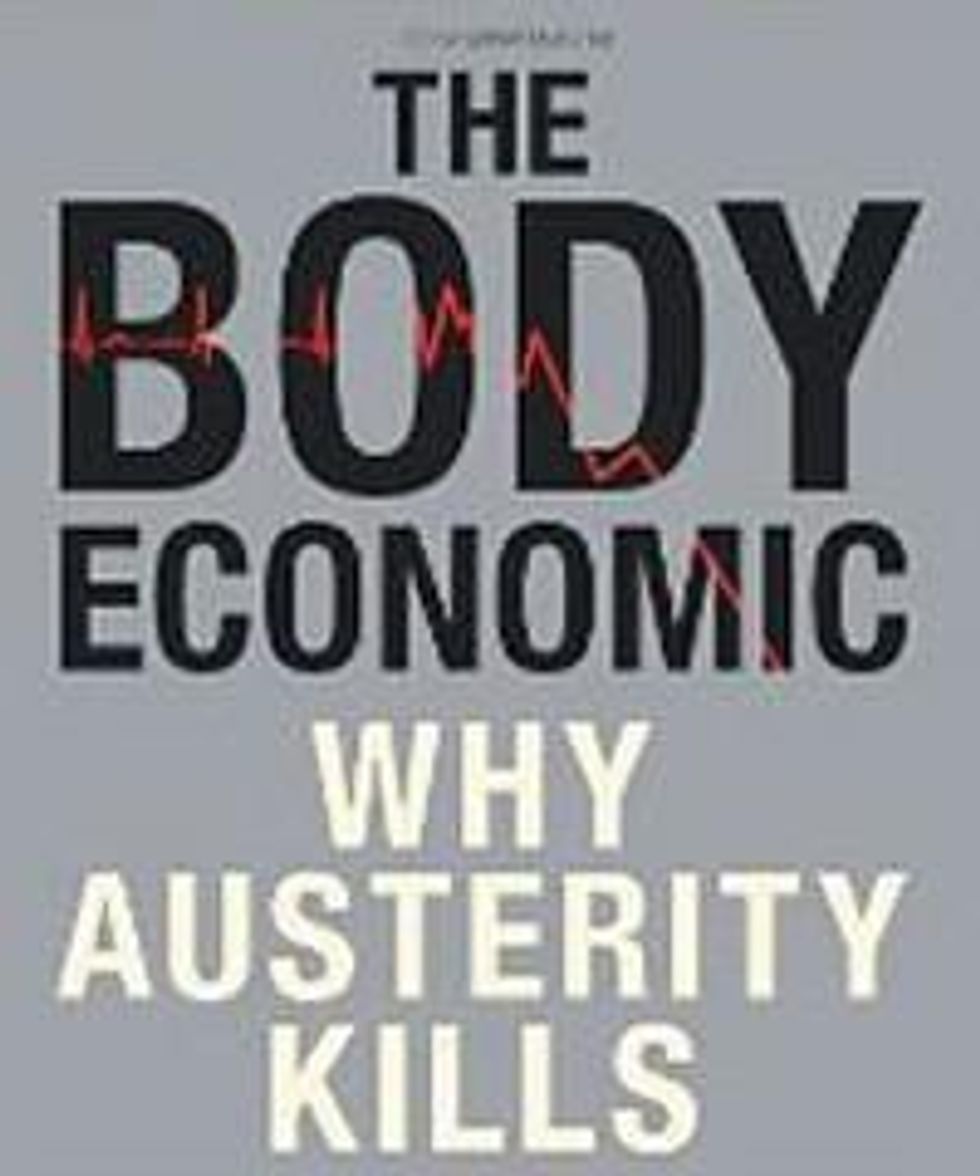The economic poison of austerity is literally killing thousands, as a recent book so superbly makes clear.
"The Body Economic: Why Austerity Kills" is written by public health specialist David Stuckler and Dr. Sanjay Basu. It examines the effects of austerity on populations across the planet. The authors claim that such policies have caused an additional 10,000 suicides and up to a million more cases of depression in Europe and the United States.
The book is an admirable work, eminently readable and yet without skimping on rigorous analysis.
It starts off compellingly.
"Thank you for participating in this clinical trial," it begins. "You might not recall signing up for it, but you were enrolled in December 2007, at the start of the Great Recession. The experiment was not governed by the rules of informed consent or medical safety. Your treatment was not administered by doctors or nurses. It was directed by politicians, economists, and ministers of finance."
Our world has provided a global lab in recent times for the effects of the free-market regimen, the authors explain, with the "patients" roughly broken down into two different clusters. The first group is comprised of countries that have suffered under austerity. In the second cohort are nations that have instead gone in for measures such as stimulus spending and preserving the social safety net. In case after case, Stuckler and Basu reveal, countries that have prioritized their people, such as Iceland and Malaysia, have seen much better health outcomes for their populations than those that have given precedence to the demands of high finance, such as Spain and Thailand.
"These experiments provided critical insights about the central findings of this book: Economic choices are not only matters of growth rates and deficits, but matters of life and death," the authors write.
Stuckler and Basu take us on a journey through Europe and Southeast Asia. The United States is a special focus of attention, both in the 1930s (where the authors detail the salutary effects of New Deal programs) and today.
"While it's too early to see the full health consequences [of the sequester], what we are seeing is the Women, Infants, Children's health program, which provides nutritional subsidies to women, will be forced to reduce those subsidies from 600,000 pregnant women," Stuckler told Amy Goodman on Democracy Now. "And that program has been linked to reducing infant mortality. We are concerned that, if done rapidly and indiscriminately, that budget cuts in the U.S. could create a repeat of the disasters that we're seeing in Europe."
Stuckler and Basu's conclusions about the murderous effects of austerity have been backed up by other observers.
"Austerity derives from the Greek austeros, for harsh or severe; but, in the area of health care, it has veered into the cruel: health expenditures dwindle, hospital budgets shrink, health care needs rise, and human suffering worsens," Dr. Adam Gaffney writes in Dissent magazine. "Suicide is on the rise; basic hospital supplies are missing; potentially life-saving surgeries are delayed; the rate of new HIV infections increases; drug shortages are ubiquitous; the prevalence of mental illness spikes."
And Gaffney asserts that austerity is being used as an ideological weapon to dismantle one of Europe's finest accomplishments in the modern era.
"Austerity is being wielded to initiate the unraveling of one of the great and humane achievements, indeed inventions, of modern Europe: the universal health care system," he writes. "The common factor to all these reforms is that they take these nations' health care systems away from universalism, both in letter and spirit."
Gaffney's observations on the effects of austerity in Greece supplement those of Stuckler and Basu.
"Doctors have reported shortages of basic hospital supplies, ranging from gloves to cotton wool," he writes. "Nurses have complained about huge increases in their patient loads. Waiting times increased, with one physician telling the New York Times that breast cancer patients were waiting three months to have their tumors excised. Despite large increases in the rates of depression, spending on mental health actually fell by 45 percent. Significant reports of drug shortages came in from across the country."
The austerity regimen is hazardous to your health.

